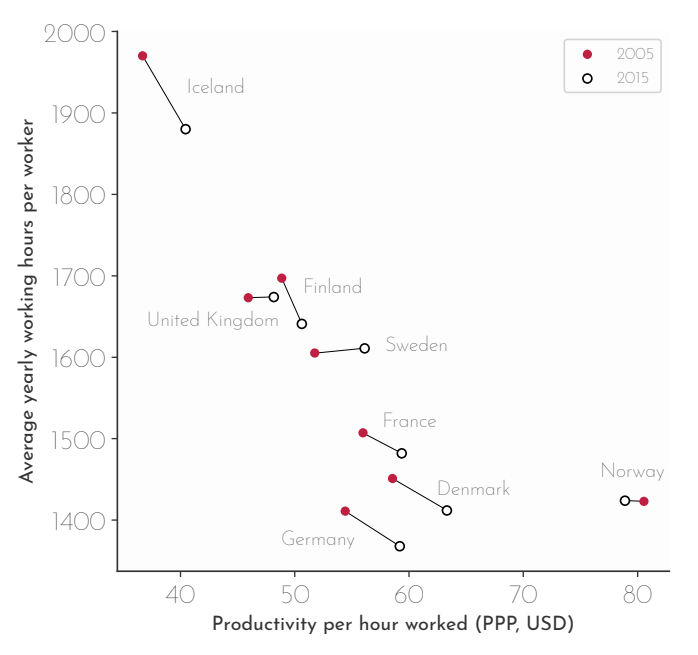Why Working Long Hours Is Unproductive
Pre-pandemic, if you were the last one in the office at night then you were seen as the hardest worker. But research has shown that working long hours doesn’t actually equate to better productivity - in fact, shorter hours do.
In North America, working a 50 hour workweek is no longer considered unusual.
In fact a recent 2021 survey from ADP uncovered that employees work an average of 9.2 unpaid hours of overtime every week - which is a sharp jump from 7.3 hours reported just one year prior. What’s more, remote and hybrid employees were found to work even more unpaid overtime, at 9.4 and 9.8 hours respectively.
For companies, this sounds great. But is it?
Hustle culture, presenteeism, and the pandemic have fueled a culture of long working hours and sometimes invisible boundaries between when the workday begins and ends. Organizations went through major challenges during the pandemic and worklife balance took a hit in order to keep businesses alive. But while the pandemic’s impact has faded, the long-hour work weeks that stemmed from it remained.
The truth is, this work culture could have a lasting negative impact on productivity. To understand better, let’s jump into what studies have found around the correlation between work hours and productivity.
The Research Is Clear: Long Hours Do Not Equal Greater Productivity
Iceland Trials Shorter Workweeks For Over 1% of Their Working Population
Iceland conducted a four year experiment investigating the impacts of having a shorter workweek. In this experiment, over 2,500 workers from various industries went from working a 40-hour workweek to a 35- or 36-hour working week without any reduction in pay. The multi-year study concluded that employees were either just as productive or more productive when working a shorter workweek. Unsurprisingly, employees also reported better well-being, expressing that they felt better, more energized and less stressed.
So what did Iceland do with these new discoveries? By June 2021, 86% of Iceland’s working population transitioned to contracts that either moved them to shorter working hours or gave them the right to do so in the future.
Similar improvements in productivity have been found in other countries working fewer hours per week, including France, Denmark and Germany.
Microsoft JAPAN raised productivity by 40% with a 4-day work week
Japan is well known for their long workhours. In 2019, Microsoft Japan conducted a test to see if longer hours actually meant more work was being done. In their experiment, they reduced the workweek from 5 to 4 days. It closed its offices every Friday and full-time employees were given paid leave during those closures.
The result? A 40% increase in productivity. Furthermore, the company found savings in its preservation of office resource costs. For example, pages printed decreased by 58.7% and electricity costs decreased by 23%. After the experiment ended, the company made the policy permanent.
Global Study Reveals The Countries With Lower Working Hours Outperform In Productivity
The U.S. prides itself on its work culture, but in the latest global study on country productivity it ranked 11th worldwide. With employees working 1,767 hours annually, American employees produced an average of $36.94 per person per hour.
Interestingly, all of the 10 countries that outranked the U.S. have employees who work fewer hours each year than U.S. employees. The top country, Luxembourg, has employees working 19% less hours than in the U.S. while being 130% more productive. Similarly, Canada puts in 217 more hours than Luxembourg but is 64% less productive. That’s huge.
In contrast, the countries included in the study whose employees worked the most hours (Mexico and Costa Rica) ranked the worst in productivity.
Studies In Progress
Just this past spring, 40 companies in both the U.S. and Canada kicked off their own 4-day work week pilot programs with 4 Day Week Global. We’ll be itching to see those results once they come out.
The Benefits They Don’t Talk About
Productivity will always be a top concern, but other benefits that have been seen from shorter work weeks shouldn’t be ignored. Here are a few:
Smaller Carbon Footprint: One global think tank forecasted a 21.3% reduction in greenhouse gases in 4-5 years if a 4-day week was adopted now. This reduction would come from multiple behavioural changes they measured - including less commuting and electricity used and more time shifted towards low-carbon activities like exercising and spending time with friends.
Better employee health: 78% of employees with 4 day weeks reported being happier and less stressed, and employees said they came to work with more energy. The companies who adopted 4 day weeks also reported a decrease in absenteeism.
Greater Engagement: In these trials, employee’s sense of engagement with their work went up and their commitment to their employer rose from 68% to 88%. There were also reports of increased confidence in their leadership teams.
Talent Acquisition & Retention: It should be no shock that employees favor a 4-day work week. In fact, 63% of businesses found it easier to attract and retain talent with a 4 day week. That means shorter work weeks could help you secure more innovative talent while also reducing the high costs associated with employee turnover.
Our Take
The hard truth is that how it was isn’t how it is. The number of hours you’re working does not equal your productivity. And equating the number of hours worked with success motivates the opposite of what companies really want.
Afterall, who is motivated to be efficient if you’re measured on hours?
In many companies, top tier talent - the rockstars who always find ways to work better and faster - are often rewarded with more work, pushing them further towards burnout. Meanwhile, their coworkers are left with the same amount of work but similar compensation.
Service companies, consulting firms, and agencies billing on an hourly basis are in a difficult spot and may need to make fundamental changes to compete in the future. More and more we’re seeing these types of companies move towards new pricing models - such as value based pricing and even outcome based pricing - to align price better with quality of work.
Our recommendation is to follow the data into the new normal.
Amazingly talented people want to know that their results matter more than their clock-out time. Companies can only benefit by starting to reward effectiveness and efficiency - and not the hours employees currently report spending on productivity theatre.
At Ari Agency & Ari Executive, we work with digital leaders and disruptors who rely on our ability to help them build innovative teams. If you’re interested in the trends impacting workforces or looking to hiring new game-changing talent, contact us today to learn more on how we can help.






